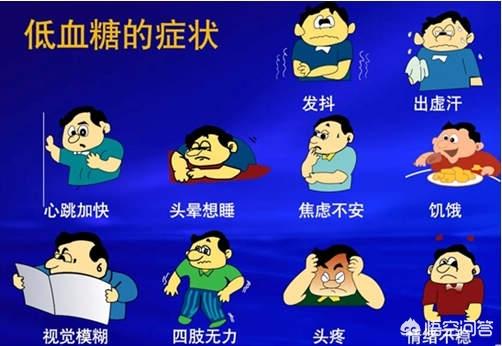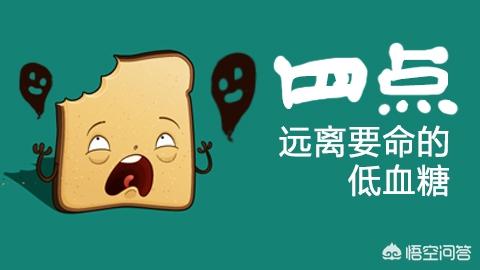Why is it that I have diabetes, walk a lot every night on insulin, and often have low blood sugar at 3 or 4 in the morning?
Answer: The reason is very "long"!
Hypoglycemia that occurs at 3 or 4 in the morning is a nocturnal hypoglycemia and is usually considered to be due to an overdose of insulin before bedtime or due to too much exercise after dinner.
One of the common adverse effects of insulin injections is hypoglycemia. A single episode of hypoglycemia may offset the benefits of good blood glucose control over a long period of time, so it is important to test blood glucose levels regularly during periods of blood glucose control with insulin to ensure that the blood glucose level is controlled to the standard and to avoid the occurrence of hypoglycemia.
In response to this occurrence of nocturnal hypoglycemia, Dr. Fresh of the Emergency Department gives the following two options that can be used to address it:
1, first of all, their own two to three consecutive days to detect the situation of blood glucose, mainly fasting and three meals after two hours of blood glucose, plus 12 o'clock at night and 3 a.m. blood glucose, according to the level of blood glucose at night and whether there is panic, sweat, blurred consciousness and other common hypoglycemic reactions, blood glucose <3.9 occurs, it is necessary to eat in a timely manner to correct the hypoglycemia, if the level of blood glucose at night is significantly lower, the test for two to three days that is, with their own test If the blood glucose level decreases significantly at night, bring your blood glucose data to the endocrinology clinic within two or three days of testing and adjust the dose of insulin injection according to the doctor's advice.
2、Avoid prolonged and large activities after dinner, if the activity increases too much compared with usual and there is nighttime hypoglycemia, then the insulin dosage before bedtime or dinner should be reduced by about 2 units, and the specific amount should be adjusted according to the blood glucose level.
Diabetes treatment is long-term, blood glucose control is also a persistent battle, long-term blood glucose control to meet the standard is the key to preventing diabetes complications, I hope that every diabetic can pay enough attention and implementation and action, health will be with you always.
For this one question, there are a few key words, diabetes; insulin, exercise; hypoglycemia.
Insulin is a relatively effective medication for lowering blood sugar and is required in people with type 1 diabetes and some type 2 diabetes.
Diabetic patients with very high blood glucose, acute metabolic disorders such as diabetic ketoacidosis, hyperosmolar syndrome, etc. need to apply insulin therapy, when the combination of trauma, acute cardiac and cerebral strokes, infections, etc. also need insulin therapy, diabetes mellitus combined with pregnancy or gestational diabetes mellitus when the need for medication, insulin therapy is also needed.
Therefore, it can be seen that insulin is still widely used. However, it is important to note that since it lowers blood sugar, hypoglycemia is bound to occur, which is one of the most significant side effects of insulin.

Hypoglycemia can occur when too much insulin is used, too much activity is done, too little food is eaten, etc., any of these things. Hypoglycemia can occur when insulin is used and there is too much activity for too long and too much activity.
Insulin before dinner will have its peak action in the early hours of the morning, and it will be at that time that hypoglycemia occurs.
To avoid the occurrence, the usual treatment is:
- Reduce the amount of medication;
- Reduce the amount of exercise;
- Reduced exercise time;
- Add dinner or bedtime;
Using any one of these measures alone will reduce the likelihood of hypoglycemia, but not all at the same time; many people go on several measures at the same time out of fear of hypoglycemia, and their blood sugar rises more significantly.

suggestiontake less medicine but not more riceAfter all, drugs are drugs and have certain side effects. Diet and exercise are also sugar-lowering measures that we require long-term adherence to.
However, if the diet is really small, you can alsoAdd half a glass of milk before bedtimeThis reduces the likelihood of nighttime hypoglycemia, as well as replenishes calcium and promotes sleep.
For patients using insulin, it is still very necessary to put a little sugary food beside the bed at night, within reach, to prevent hypoglycemia when the body is weak and can not touch the food, and there is no one around to help, that would be very troublesome!
This is Dr. Sun, follow Dr. Sun on Sugar for continued quality health knowledge, please leave a comment below if you have any questions, and I will reply!
Low blood sugar in the wee hours of the morning is normal. Have candy ready.
Find a professional suitable for their own exercise, exercise certainly can not be excessive, the emergence of hypoglycemia to find a professional doctor, the emergence of hypoglycemia is very dangerous!
That's the bad thing about insulin! It's easy to get hypoglycemic! People who take insulin must have some candy and cookie sub type treats on hand!
It varies from person to person, and it is best to consult an endocrinologist at a regular hospital.
Why do you walk for a long time every night?
If you work out you can get no or fewer shots, how many shots per day should be planned or estimated food intake to decide, the specifics should be tested in time to feel out their own amount.
Don't walk too much at night, moderation is good, what do you mean by moderation, that is, you sweat slightly and don't feel tired, that is moderation.
This question and answer are from the site users, does not represent the position of the site, such as infringement, please contact the administrator to delete.